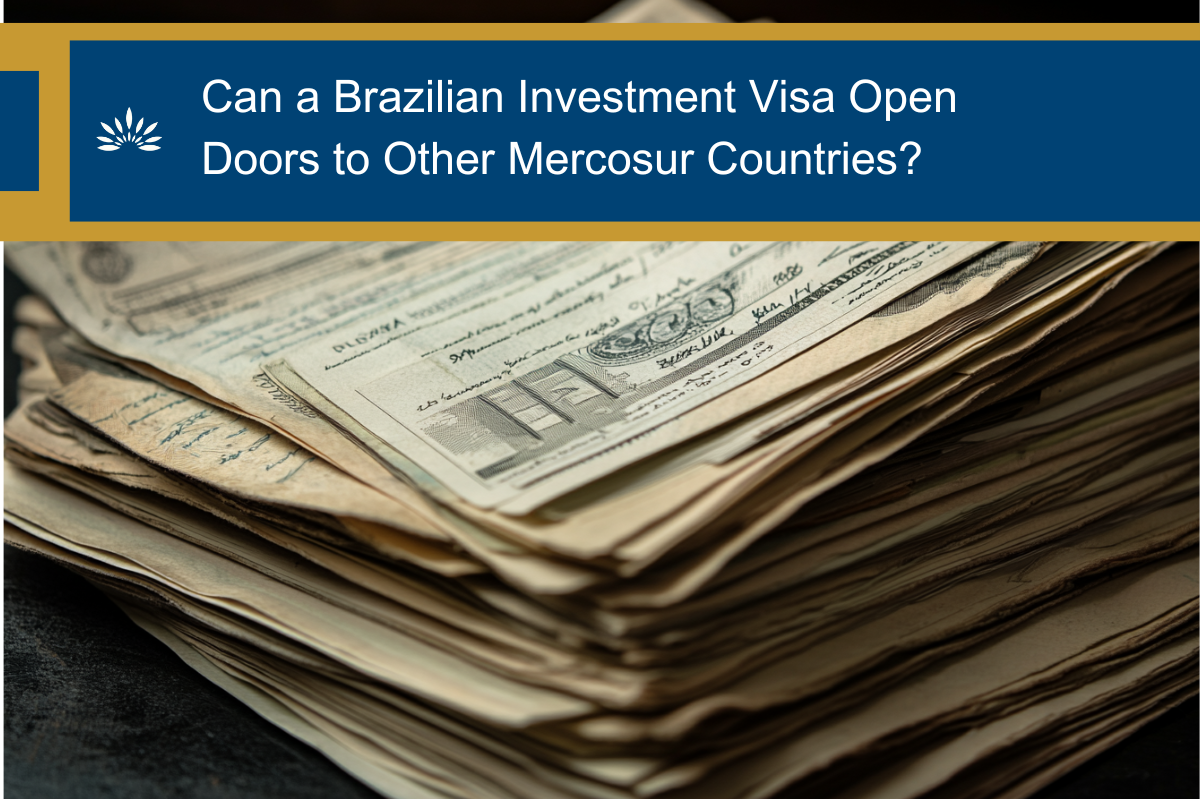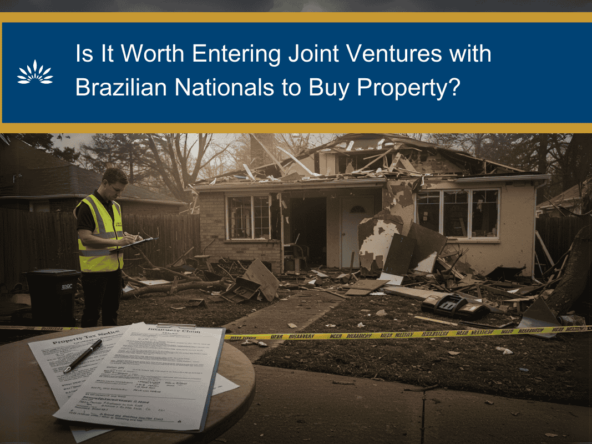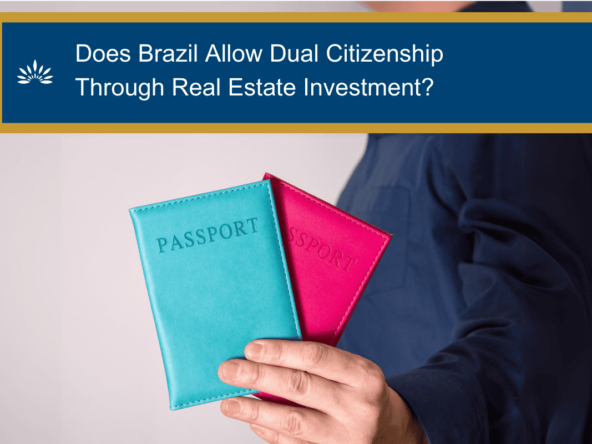Samantha and Jake, a couple from Miami, found themselves at a cozy café in São Paulo discussing their future plans in South America. Samantha had her laptop open, scrolling through international property listings. “If we go for a golden visa in Brazil,” she said, “I heard we can secure brazilian permanent residency and potentially expand into other mercosur member countries.” Jake, eyeing a bustling street scene, added, “That’d be incredible. Imagine the investment opportunities not just here, but also in places like Argentina or Uruguay. But I keep hearing conflicting things about how straightforward it is to leverage our permanent residency through investment for cross-border moves.”

If you find yourself in a similar conversation—wondering if a visa in Brazil can truly unlock the doors to neighboring mercosur countries—then this article is for you. We’ll dive into the mercosur definition, examine how permanent residency status in Brazil might help you expand your business or set up a new life elsewhere in the region, and clarify the actual scope of privileges tied to a golden visa program. By the end, you’ll have a clearer picture of how this process works, the typical residency duration required, and whether these benefits translate into practical, real-world advantages such as permanent residency in Argentina or simpler routes to a business permit across borders.
If you need personalized legal advice on foreign residency or real estate purchases in Brazil, Oliveira Lawyers stands ready to assist with any cross-border or immigration-related questions. And if you’re looking to acquire real estate as part of your investment visa strategy—particularly in coveted locations like Rio de Janeiro or São Paulo—Camila Saunier International Realty can help you pinpoint the perfect property for your goals.
Let’s explore how a permanent residency through investment might indeed open a broader pathway, offering access to mercosur member countries and fueling your potential for business expansion throughout South America.
1. The Essence of Mercosur: What It Is and Why It Matters
To better grasp the possible benefits for individuals holding brazilian permanent residency, we first need a solid mercosur definition. Officially, Mercosur (often spelled Mercosul in Portuguese) stands for “Mercado Comum do Sul,” or the Common Market of the South in English. This economic and political bloc was formed to unify trade regulations, reduce or eliminate tariffs, and foster the free movement of goods, services, and even people among its founding mercosur member countries—namely Brazil, Argentina, Uruguay, and Paraguay.
Venezuela joined at one point but remains suspended, and Bolivia is in the process of full membership. While some details shift over time, the shared vision is straightforward: strengthen ties between mercosur countries to create a stronger collective presence in global trade, facilitate cross-border mobility, and spur cooperative development projects.
From an investor’s perspective, Mercosur represents a broad regional marketplace. For anyone seeking a visa in Brazil, or more specifically a golden visa, the possibility of easier regional integration is undoubtedly attractive. However, it’s important to note that not every advantage open to Brazilian citizens automatically transfers to Brazilian residents—even those with permanent residency status. The scope of your benefits in other mercosur member countries will hinge on local immigration policies, the residency duration you’ve fulfilled, and sometimes bilateral or multilateral agreements among the countries in question.
Why Brazil Is the Centerpiece
You might wonder: Why focus on Brazil for a residency-by-investment route? Brazil is the largest economy in Latin America and a key driver in Mercosur’s policies. Holding brazilian permanent residency can ease your entry into certain sectors of the Brazilian market—be it tech, agriculture, real estate, or manufacturing—and might also give you a smoother path if you want to explore business expansion into neighboring nations.
2. The Brazilian Investment Visa (Golden Visa Program)
One appealing avenue for foreigners eyeing Brazil is the golden visa program, sometimes simply called the “investment visa.” This program lets foreign nationals obtain brazilian permanent residency if they invest a qualifying amount in specific sectors, such as a Brazilian company or real estate.
Permanent Residency Through Investment: By injecting capital into Brazil—whether via shares in a local business, direct entrepreneurial investment, or sometimes real estate—you can become eligible for long-term residency.
Residency Duration: Once granted, you typically receive permanent or temporary residency. The conditions and timelines depend on current legislation. Over time, fulfilling the residency duration requirement positions you for full citizenship if that’s part of your plan.
The Appeal of a Golden Visa
- Security: Investing funds in a stable or emerging market can offer both financial returns and a secure base.
- Mobility: While not automatically granting you free rein across all mercosur member countries, a strong base in Brazil simplifies business or personal travel across the region.
- Diverse Industries: From São Paulo’s tech startups to Bahia’s tourism to Rio’s bustling economy, you’ll find varied investment opportunities.
For specific questions about how to structure your investment, how to apply for the investment visa, or how to maintain your permanent residency status once obtained, consider consulting with Oliveira Lawyers. Likewise, if you plan on purchasing property as the foundation of your visa, reach out to Camila Saunier International Realty.
3. Mercosur Mobility: Myth vs. Reality for Brazilian Residents
Many prospective investors envision that once they secure their brazilian permanent residency via a golden visa program, they can simply pick up and move to any other mercosur member country without further red tape. While Mercosur aims to ease travel and commerce, the actual processes for relocating or working in other member states can still require legal steps, especially if you’re not yet a Brazilian citizen.
Who Benefits the Most?
- Brazilian Citizens: They typically enjoy the fewest hurdles, often qualifying for streamlined residency or labor rights in Argentina, Paraguay, and Uruguay.
- Brazilian Permanent Residents: They may benefit from simplified processes compared to foreigners from non-member countries. However, those benefits are less comprehensive than for full citizens.
For instance, imagine you’ve lived in Brazil for four years under a golden visa. You may find it easier to apply for permanent residency in Argentina compared to someone who lacks ties to the region. Yet, you might still need a business permit or separate residency application if you plan to work or start a company in Buenos Aires. This partial advantage can make a significant difference if you’re planning cross-border expansions, but it’s not an automatic pass to live and work seamlessly in all mercosur member countries.
Pro Tip: Even with Brazilian residency, always check specific requirements for each Mercosur nation you plan to operate in. Local policies can differ significantly.
Practical Example: Startups and Expansion
Suppose you launched a successful eco-friendly clothing brand in Rio de Janeiro and now want to extend your reach to Uruguay. If you’re a Brazilian citizen, you likely have a more direct route to establishing a presence there. As a foreign resident, you still stand a better chance than someone based outside Mercosur, but you might have extra paperwork or local compliance steps to tackle. In short, you gain an advantage, but not complete equivalence to citizenship holders.
4. Unpacking Permanent Residency in Argentina and Beyond
Argentina stands out as a popular option for those who have invested in Brazil and wish to explore other mercosur countries. Its vibrant culture, bustling markets in Buenos Aires, and rich resources appeal to entrepreneurs, especially in areas like agriculture, wine, and tourism.
4.1. Simplified Pathways
If you’re considering permanent residency in Argentina after securing brazilian permanent residency, Mercosur might facilitate a more straightforward process compared to a U.S. or European investor with no prior ties. That said, immigration authorities in Argentina may still require documentation proving your residency in Brazil, your financial stability, and possibly a background check. The time you’ve spent under permanent residency status in Brazil can play a role in how favorably Argentine officials view your application.
4.2. Business Permit Requirements
Whether you’re aiming to open a café, a tech startup, or a farm in Argentina, you’ll likely need a business permit or relevant local registrations. Mercosur can sometimes smooth the application process because of mutual recognition and simplified cross-border frameworks. However, you should still consult experts—immigration attorneys, business advisors, and accountants—to ensure compliance.
5. Key Benefits of Operating Regionally Under Mercosur
For entrepreneurs and investors, establishing a strong foothold in Brazil—via a golden visa program or another type of investment visa—goes beyond just benefiting from Brazil’s large domestic market. You also tap into the broader Mercosur network.
- Reduced Tariffs: Member states seek to eliminate or minimize tariffs and trade barriers. If your product is manufactured in Brazil, you may find it cheaper to export to Argentina or Uruguay.
- Larger Consumer Base: Collectively, mercosur member countries represent around 300 million consumers. Having a strategic presence in one or more of these markets can significantly boost your business footprint.
- Potential for Expansion: Building a supply chain across multiple mercosur countries could reduce costs, accelerate production, or unlock new revenue streams.
A Snapshot Comparison Table
| Country | Ease for Brazilian Residents | Top Sectors | Potential Challenges |
|---|---|---|---|
| Brazil | Base country; you hold permanent residency status or citizenship. | Tech, Agriculture, Manufacturing | Navigating bureaucracy, learning Portuguese |
| Argentina | More straightforward for Brazilian citizens; easier process for residents. | Wine, Tourism, Agriculture, Tech | Economic fluctuations, currency controls |
| Uruguay | Generally open policies for Brazilians and permanent residents. | Finance, Real Estate, Services | High cost of living in some areas, smaller population |
| Paraguay | Streamlined or simpler in many cases, but still requires local steps. | Agro-Industry, Energy, Manufacturing | Limited infrastructure in rural regions |
6. The Road to Brazilian Citizenship: Is It Necessary?
While brazilian permanent residency delivers a host of benefits, some individuals aim higher by pursuing full Brazilian citizenship. Citizenship grants you a Brazilian passport, the right to vote, and broader privileges under Mercosur’s integration treaties. The route typically involves meeting a residency duration requirement (e.g., four years, though it can vary), demonstrating a grasp of Portuguese, and maintaining a clean legal record.
Why Citizenship Might Be Worth It
- Ease of Movement: Brazilian citizens generally enjoy smoother processes for living, working, or investing in mercosur countries like Argentina and Uruguay.
- Enhanced Stability: Holding a Brazilian passport can make you less vulnerable to changes in immigration policies that might affect temporary or permanent residents.
- International Travel: Brazil has visa-waiver agreements with several global destinations, expanding your travel freedom beyond the immediate region.
Example: If your ultimate plan includes frequent cross-border expansions, investing in property across multiple Mercosur countries, or living a binational lifestyle, obtaining citizenship can be a game-changer.
However, not everyone needs or wants to go this route, especially if their primary focus is simply enjoying a stable base in Brazil.
7. Real Estate as a Stepping Stone: Investment Opportunities in Brazil
Many foreigners opt to fulfill their permanent residency through investment by purchasing real estate. This route can be both a stable asset and a ticket to brazilian permanent residency. Whether you fancy a beachfront condo in Rio de Janeiro or a sleek high-rise in São Paulo, the Brazilian property market offers diverse choices.
Working With Professionals
Consult with Camila Saunier International Realty for current market trends, property evaluations, and assistance with the entire buying process, including closing costs. Because the rules for a golden visa program might change over time, it’s crucial to ensure the property you plan to purchase meets the updated investment threshold and other legal requirements.
Beyond Brazil: Eyeing Other Markets
Once you’ve established your base in Brazil, you might spot investment opportunities in neighboring countries. Owning a secondary property in Argentina or Uruguay could become more accessible if you meet local regulations. For example, you might enjoy reduced taxes or simplified purchase processes, especially if you’ve upgraded from brazilian permanent residency to citizenship. While not guaranteed, these cross-border synergies often spark an exciting range of prospects.
8. Overcoming Bureaucratic Hurdles
South American bureaucracy can appear challenging, and you should expect some red tape regardless of your status. However, being part of the Mercosur framework frequently reduces or streamlines the necessary procedures.
Tips for Navigating the System
- Seek Local Counsel: Whether you’re applying for a business permit in Argentina or finalizing property transactions in Paraguay, local attorneys and accountants can clarify the ever-changing regulations.
- Track Paperwork Carefully: Collect and maintain all supporting documents that prove your permanent residency status in Brazil, your financial solvency, and your lawful compliance.
- Stay Updated: Policies—especially regarding the investment visa or golden visa program—can change. Regularly check official government websites or consult with Oliveira Lawyers.
9. Can a Brazilian Investment Visa Truly Open Doors to Mercosur?
The short answer is yes, but with important qualifiers. A visa in Brazil that grants you brazilian permanent residency can pave the way for fewer obstacles in certain mercosur countries, thanks to the bloc’s integration policies. However, you must remember that this doesn’t automatically grant you the same rights as a Brazilian citizen or as a citizen from another Mercosur country in terms of indefinite work or settlement. You may still need:
- A specific business permit if you want to operate a company in another member state.
- Additional residency applications if you seek to live long-term in, say, Argentina or Uruguay.
- Compliance with local labor laws if you plan to employ or be employed in a neighboring country.
10. Business Expansion Strategies Within Mercosur
Perhaps the most compelling draw for many is the prospect of business expansion. By using Brazil as a launchpad, you can test your product or service in the largest market in South America before moving into neighboring states. This approach allows you to refine your business model, expand your network, and familiarize yourself with local cultures and consumer behaviors—all under the protective umbrella of your permanent residency status.
Cross-Border Synergy
Let’s consider a scenario: You import specialty coffee beans for a chain of boutique cafés in Rio. With the advantage of lower tariffs and a well-built distribution network in Brazil, you decide to open branches in Buenos Aires. Even though you’ll face new registration requirements, you can use your established presence—and existing relationships with Brazilian suppliers—to streamline operations. Additionally, if you choose to relocate some employees to Argentina, being recognized as a resident of a Mercosur nation can sometimes expedite their relocation or visa processes.
11. Potential Pitfalls and How to Avoid Them
Assuming Full Reciprocity: Not all mercosur member countries treat permanent residents of Brazil equally. Some might require further proof of financial stability or place limitations on your working rights.
Neglecting Tax Implications: Operating across multiple jurisdictions can complicate your tax obligations. Seek expert accounting guidance to structure your investments and expansions effectively.
Ignoring Language Barriers: Portuguese might not suffice in Spanish-speaking Mercosur nations, so consider language training for seamless communication.
Misunderstanding Residency Requirements: Let’s say you need to maintain a certain number of days annually in Brazil to keep your permanent residency status. If you spend too much time in other countries, you could inadvertently forfeit your residency.
12. The Future of Mercosur: Trends and Developments
While Mercosur has faced hurdles—economic crises in member states, political disagreements, and global trade shifts—it still represents a vital platform for regional cooperation. Ongoing negotiations, such as potential trade pacts with the European Union, could further open markets and strengthen investor confidence.
For those holding a visa in Brazil or a golden visa program-based status, these shifts might translate into more robust investment opportunities. If Mercosur secures significant trade agreements or further liberalizes cross-border labor mobility, the benefits of your brazilian permanent residency could expand, granting even smoother transitions between mercosur countries.
Bringing It All Together
- Brazil is your primary portal to Mercosur, offering the largest market and a straightforward investment visa route.
- Mercosur membership aims to reduce friction between neighbors, but each country retains autonomy over its residency and work permit rules, especially for foreigners who aren’t full citizens.
- Permanent Residency Through Investment in Brazil lays a foundation, but residency duration and subsequent citizenship can unlock greater freedoms.
- Thorough research, professional legal help, and a strategic approach can help you leverage your brazilian permanent residency for business or personal expansions across the region.
Conclusion
What’s your take? Are you interested in leveraging a visa in Brazil to explore business or lifestyle ventures throughout the Mercosur region? Share your thoughts or questions in the comments below—we’d love to hear your perspective!
Jake and Samantha’s discussions at that café in São Paulo highlight a key truth: securing a golden visa and achieving brazilian permanent residency can indeed open doors to other mercosur member countries, but the process isn’t as automatic or sweeping as some might assume. Each nation retains its own regulations, so whether you’re chasing permanent residency in Argentina, eyeing a business permit in Paraguay, or expanding operations in Uruguay, it pays to do your homework, stay current on shifting laws, and consult professionals.
If you’re ready to make your move, start by seeking expert guidance:
- For immigration and legal insights, contact Oliveira Lawyers to get personalized counsel on pursuing a golden visa program, maintaining permanent residency status, or applying for residency in other mercosur countries.
- For real estate acquisitions, which can serve as a cornerstone for your investment opportunities, reach out to Camila Saunier International Realty. They’ll help you find the ideal property to jump-start your life and business in Brazil.
FREQUENTLY ASKED QUESTIONS (FAQs)
1. What exactly is the simplest mercosur definition relevant to investors?
Mercosur is a regional bloc—“Common Market of the South”—uniting Brazil, Argentina, Paraguay, and Uruguay to promote free trade, economic cooperation, and easier mobility among member countries.
2. How does permanent residency through investment in Brazil differ from other visas?
A golden visa program in Brazil is specifically designed for investors. You commit funds to local businesses or real estate, and in return, you gain brazilian permanent residency faster than traditional immigration pathways.
3. Does my brazilian permanent residency automatically grant work rights in other mercosur countries?
Not automatically. You usually need a business permit or separate work authorization in the specific country. However, holding a visa in Brazil can simplify some procedures due to regional agreements.
4. What is the typical residency duration needed before applying for Brazilian citizenship?
It varies but often requires several consecutive years living in Brazil, maintaining your permanent residency status, and meeting other criteria like Portuguese proficiency.
5. Are there direct pathways to permanent residency in Argentina if I’m a Brazilian resident?
Yes, permanent residency in Argentina is often simpler for Brazilian citizens and sometimes for Brazilian permanent residents, though the process is still not automatic and may involve additional documentation.
6. Which industries offer the best investment opportunities for golden visa holders in Brazil?
Technology, agriculture, real estate, and manufacturing remain strong. Brazil’s diverse economy allows you to explore a broad range of investment opportunities based on your expertise and market conditions.
7. Can I lose my permanent residency status if I stay outside Brazil for too long?
Yes, you risk losing your brazilian permanent residency if you exceed the maximum allowance for time spent abroad. Always verify the current regulations for residency duration requirements.
8. How does business expansion work for a startup wanting to operate in both Brazil and other mercosur member countries?
You’ll often benefit from reduced tariffs and more straightforward export procedures. Nevertheless, each country has its own rules for establishing a local entity or acquiring a business permit.
9. What is the main advantage of choosing a visa in Brazil instead of another South American country?
Brazil’s robust economy and leadership in Mercosur make it a prime launchpad for cross-border expansions, offering a larger customer base and potentially smoother transitions to neighboring nations.
10. Do all mercosur countries apply uniform rules for residency and work permits?
No, each mercosur member country retains autonomy over residency requirements. The bloc simplifies certain aspects, but you must still comply with each country’s local rules.
11. Is it easier to get a golden visa by investing in real estate or a company?
It depends on current regulations. Both options can qualify. If you opt for real estate, working with Camila Saunier International Realty helps ensure you meet official criteria for the investment visa.
12. Can I eventually gain citizenship in more than one mercosur country if I maintain residencies in each?
In some cases, dual or multiple citizenships are possible, but rules vary significantly by nation. You should consult Oliveira Lawyers to navigate potential legal complexities.





